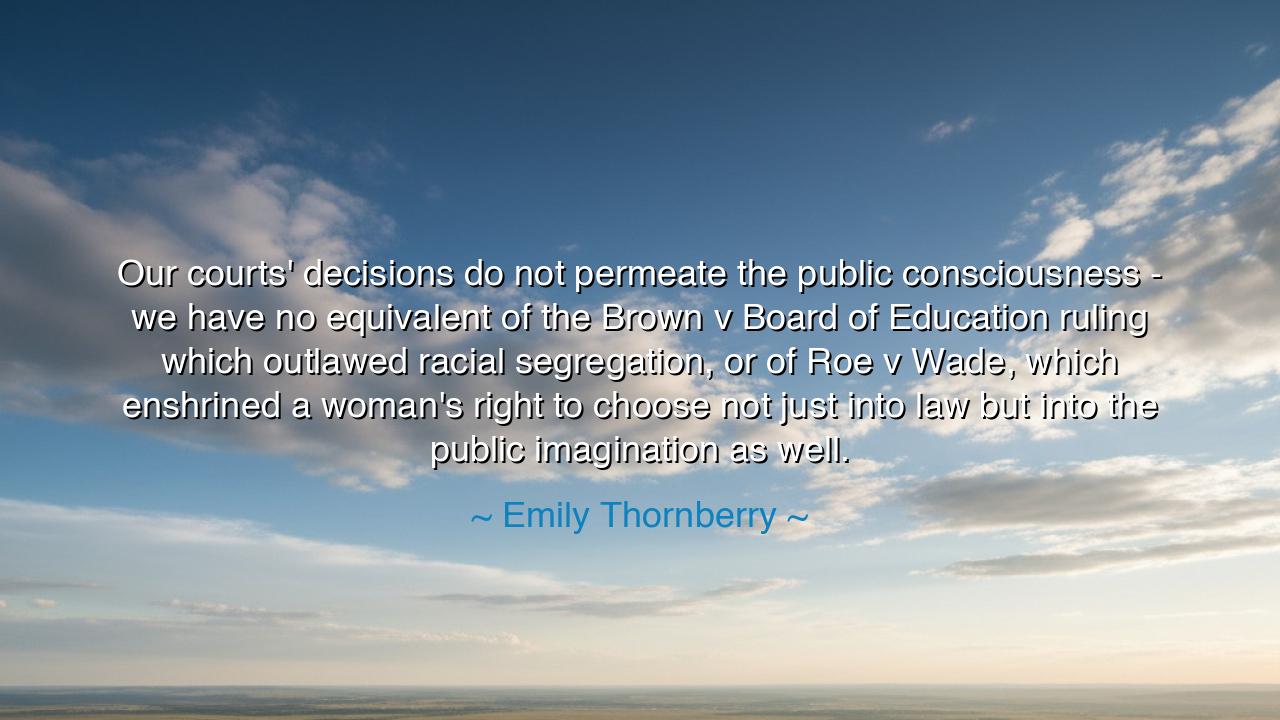
Our courts' decisions do not permeate the public consciousness -
Our courts' decisions do not permeate the public consciousness - we have no equivalent of the Brown v Board of Education ruling which outlawed racial segregation, or of Roe v Wade, which enshrined a woman's right to choose not just into law but into the public imagination as well.






The words of Emily Thornberry — “Our courts’ decisions do not permeate the public consciousness; we have no equivalent of the Brown v. Board of Education ruling which outlawed racial segregation, or of Roe v. Wade, which enshrined a woman’s right to choose not just into law but into the public imagination as well.” — speak of a wound within the heart of justice itself. She laments not the absence of law, but the absence of spirit within law — for a nation is not uplifted merely by the scrolls of its statutes, but by the fire that burns in its people’s hearts when justice becomes living truth. Laws written on parchment fade; laws written in the public imagination endure for generations.
From the dawn of civilization, wise men and women have known that the greatest power of judgment is not in its decree, but in its echo. When the sages of Athens first debated the codes of Solon, they did not merely seek to restrain wrongdoing — they sought to awaken conscience. So too did the prophets and philosophers of old speak to the soul of their people, not to their convenience. But in the time of Emily Thornberry, she beholds a landscape where judicial wisdom is confined to chambers and not to hearts — where verdicts pass like fleeting winds, stirring neither courage nor conviction among the people.
In her invocation of Brown v. Board of Education, Thornberry calls forth a moment when law and moral awakening became one. That ruling, in 1954, was not merely the end of segregation in schools; it was a torch flung into the darkness of centuries. It told a people long silenced that they were seen, that equality was not a dream deferred but a birthright restored. It spoke not to the legal scholar alone, but to the child walking into a classroom for the first time where all colors could sit side by side. Thus, it entered not only the books of law but the consciousness of humankind.
And when she names Roe v. Wade, Thornberry speaks of another transformation — one that reached deep into the quiet chambers of every home, every family, every woman’s soul. That judgment did not command belief; it opened a space for freedom of choice, for the sacred right of a person to determine her own path. It transcended legislation to become part of the world’s ongoing conversation about autonomy, body, and destiny. Whether one agreed or not, all were moved to reckon with it — and thus it lived, vibrant, within the public imagination.
What Thornberry mourns is the absence of such awakenings in her own land — a silence where there should be thunder. She sees a nation where the courts’ decisions, however noble, fail to stir the people, fail to shape the dreams and moral fiber of the age. It is as if justice whispers from its marble halls, yet the multitude walks on, untouched and unmoved. For what good is law, if it does not teach? What use is verdict, if it does not kindle the collective soul to righteousness?
Let us then recall the example of Nelson Mandela, who stood before the court that condemned him and turned his trial into a sermon for the world. “I have cherished the ideal of a democratic and free society,” he declared, knowing those words might be his last. His conviction — meant to silence — became an anthem. There, in the very machinery of judgment, a man transformed the law’s punishment into moral prophecy. The true measure of justice, then, lies not in what the court declares, but in how its declaration reshapes the heart of a people.
The lesson for us, dear listener, is this: Justice must breathe. It must walk among the people and stir their blood. It is not enough to pass rulings; we must pass remembrance, discussion, and moral awakening. Speak of justice not as a distant structure but as a living covenant. Teach your children not only the laws of their land but the reasons why those laws matter. Read the judgments of history as if they were your own inheritance — for indeed, they are.
And so, the teaching stands: a nation’s strength is not found in its courts, but in its consciousness. Let the spirit of Brown, of Roe, of every righteous struggle, dwell not in the libraries of law but in the chambers of the heart. For when justice ceases to echo in the soul of the people, it ceases to be justice at all. Therefore, live as carriers of that echo — so that your children, and their children after them, may hear it still.






AAdministratorAdministrator
Welcome, honored guests. Please leave a comment, we will respond soon